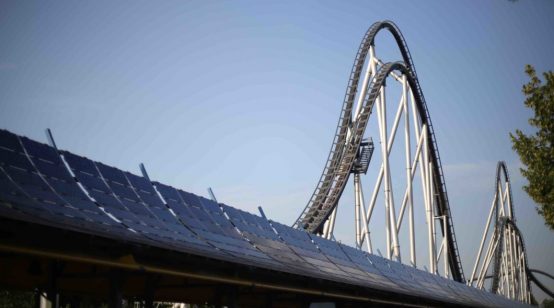The Greek island of Tilos is set to become the first in the Mediterranean to be autonomously powered by renewable sources after the European Commission invested €12.5 million in an 800-kilowatt wind turbine and a 160-kW solar photovoltaic park.
The investment in the Tilos (Technology Innovation for the Local Scale, Optimum Integration of Battery Energy Storage) project is coming from the EU’s Horizon 2020 research and innovation programme.
The Aegean island (pictured) had used a 90km undersea cable from neighbouring Kos but during the summer businesses were forced to rely on diesel-powered generators to keep the power on as demand outstripped supply.
Now the Tilos project is proving so efficient that oil-powered Kos will soon be importing energy from its smaller neighbour.
The population of Tilos swells from around 400 during the winter to about 3,000 in the summer.
The project is being coordinated by the Technological Education Institute of Piraeus with participation from Greek energy company Eunice, the manager of the electricity network Hedno and WWF Greece. It also involves 13 partners from seven EU countries.
Renewables firm, the Sun Investment Group, said the island would set an example for how to avoid power blackouts across the EU, especially as the price of lithium-ion battery packs had fallen in recent years.
The commission said it provided Tilos with €12.5 million of the €15.7 million needed to go renewable, demonstrating how member states could comply with the 2020 target of generating 20 per cent of power from renewables.
And the falling cost of lithium-ion batteries is making the Tilos project increasingly feasible elsewhere.
“The rate of change is phenomenal,” said Smart Energy Council member John Grimes. “Batteries have become cheaper far quicker than expected.”
Between 2014 and 2016, the price of lithium-ion battery packs fell by more than 50 per cent and prices fell from US$400 per kilowatt hour (kWh) to US$190, with the cost projected to fall below US$100/kWh by 2025.
Andrius Terskovas, development chief at Sun Investment, said: “The decreasing prices of lithium-ion batteries used to power solar farms will surely lead to the further adoption of solar energy as a way of avoiding power outages across Europe.
“The batteries store energy produced on sunny days, which can then be deployed for use during times of power outages or heavy demand such or in the case of Tilos: tourist season.”
Tilos in the Aegean Sea. Picture credit: Wikimedia





